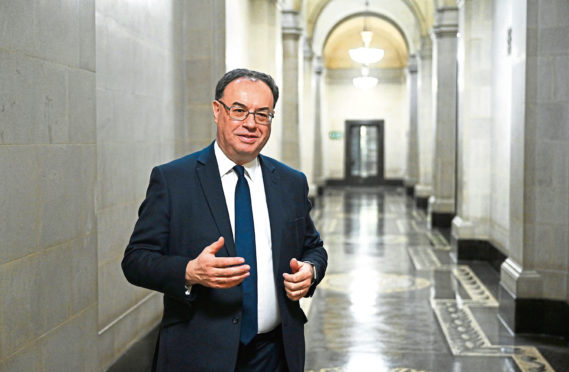Bank of England governor Andrew Bailey has warned negative interest rates may deprive the economy of funds to help speed up recovery.
He did not expressly rule out the move in a virtual event organised by the Scottish Chambers of Commerce yesterday.
But he seemed lukewarm about the UK potentially following in the footsteps of countries including Sweden, Denmark and Japan in taking the base rate below zero for the first time.
There is growing speculation the Bank may do so as early as next month, with recent comments by Silvana Tenreyro, a member of the Bank’s rate-setting Monetary Policy Committee, adding fuel to the fire when she said it could be done without crippling the banking system.
Interest rates have been at a historic low of 0.1% since last March as fiscal policymakers moved quickly to protect the economy from the ravages of the Covid-19 outbreak.
Massive shock
Despite £450 billion committed to “quantitative easing” – effectively printing money – over the past year, the Bank is facing a huge challenge to make up the ground lost since the start of the pandemic, with the first lockdown having delivered a massive shock to the economy.
Mr Bailey said the gap had closed from an initial 20% blow to economic output, but productivity was still about 10% below pre-pandemic levels.
He also estimated the UK unemployment rate is now running at about 6.5%, compared to an official figure of 4.9% (4.2% in Scotland), with worse to come as people come off furloughing in the spring.
But there are “a lot of issues” to consider with using negative interest rates as a fiscal tool, Mr Bailey said, adding: “At first glance they are counter-intuitive.
“First of all, no country has really used negative interest rates at the retail end of the market.”
The “monetary transmission mechanism” – a crucial part of economic recovery – and the ability to stimulate corporate investment are “hugely dependent” on banks, which in turn need a rate of return, he said.
He also highlighted practical challenges to introducing negative interest rates, revealing The Bank has already held discussions with the banking industry to find out if IT systems would be able to cope.
We want banks to have capital to support lending, even when the economy turns down.”
Mr Bailey, who succeeded Mark Carney last March, also said the Covid-19 crisis had produced “the first big test” of the strength of Britain’s banking system since reforms in the wake of the 2007-08 financial crisis and the industry had “come through it well”.
He added: “We want banks to have capital to support lending, even when the economy turns down.”
Scottish seafood exporters have reported major problems getting produce to mainland Europe since Brexit, but Mr Bailey said it was too early to judge how disruptive leaving the EU may be for the UK economy after a period of “adjustment”.
The new and more virulent strains of Covid-19 will depress economic activity in the first half of this year, he said, adding the roll-out of vaccinations was the best hope of it “coming back to a former level of life” as quickly as possible,
But it will be a long haul before the economy starts growing at a rate fast enough to offset the economic cost of Covid-19, he said.
Silvana Tenreyro looks at the impact of negative rates in other countries. And if they could work in the UK in the future. https://t.co/lxdZ2k1V9Z pic.twitter.com/cM4rnrWK1e
— Bank of England (@bankofengland) January 11, 2021
